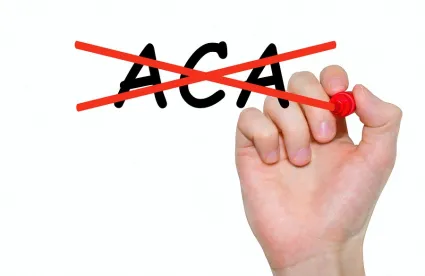A 105-page “discussion draft” of unofficial legislative language addressing the repeal and replacement of the Affordable Care Act (ACA) contemplates using the 2017 budget reconciliation process—which likely guarantees the bill’s passage through the US House of Representatives and US Senate but also limits it to items that have a budgetary consequence.
While this unofficial discussion draft is at least two weeks old and may differ significantly from the final language, it contains a number of items of interest to employers.
Namely, the discussion draft proposes to do the following:
-
Zero out the penalty for the individual and employer mandate (1.1.2016)
-
Extend the current ACA Exchanges and associated tax credits (with changes) through 12.31.2019
-
Repeal most ACA taxes in 2017 or, in some instances, no later than 2020
-
Allow health savings account (HSA), flexible spending account (FSA), and health reimbursement account (HRA) usage for over-the-counter drugs (1.1.2017)
-
Drop the HSA excess contribution tax back down to 10% (1.1.2017)
-
End the $2,600 cap on health FSA contributions (1.1.2017)
-
Reinstate the deduction for Medicare Part D subsidies (1.1.2017)
-
Repeal the Medicare tax increase (1.1.2017)
-
Increase HSA contributions to the sum of the high deductible health plan (HDHP) deductible and out-of-pocket limits (1.1.2018)
-
Allow expenses incurred during the first 60 days of HDHP participation to be reimbursed by an HSA as long as the HSA is established during the 60-day period (1.1.2018)
-
Allow both spouses to make HSA “catch-up” contributions to a single HSA (1.1.2018)
-
Create an age and headcount-driven advanceable and refundable tax credit (with an absolute cap of $14,000 per year) for individuals who are not eligible for employer (and other) coverage and who purchase health insurance in the individual market or non-subsidized COBRA coverage starting on 1.1.2020
-
Most significantly, cap tax-free employer health coverage at the 90th percentile of 2019 group health plan cost, as determined by the Secretary 1.1.2020. The 90th percentile would be indexed in future years through a Consumer Price Index (CPI) plus 2% calculation. To the extent that the COBRA-like value of a group health plan exceeds the 90th percentile, the excess is reported, withheld, and taxed as wages to the individual.
A number of these items are found in more general terms in the ObamaCare Repeal and Replace Policy Brief and Resources released before Congress began its Presidents Day recess.



 />i
/>i
